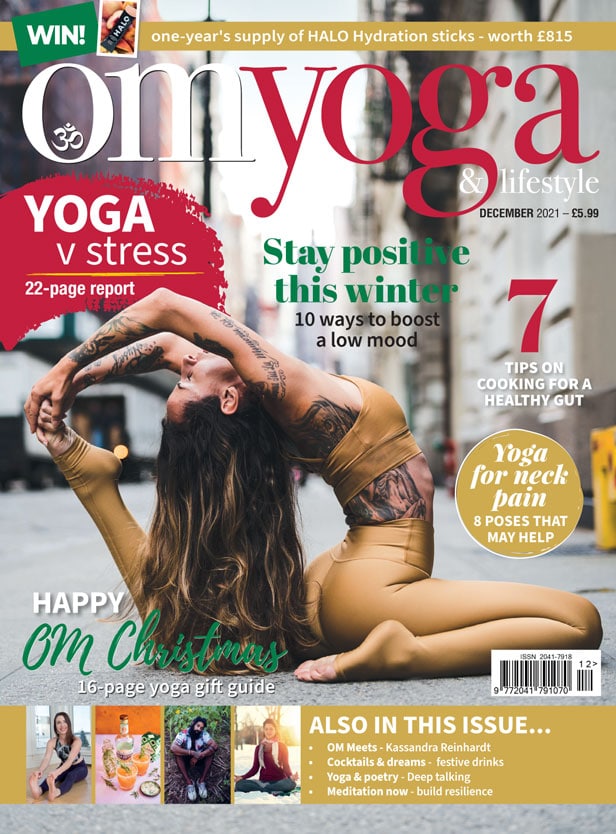
Stay positive this winter
10 ways to boost a low mood and stay positive this winter. By Dr Audrey Tang
Positive psychology (the study of what makes people more likely to thrive, even through adversity) has been a growing field since the 1980s, and research has found that a positive mindset can be connected to:
- Greater life satisfaction
- A higher cheerfulness rating
- Lower reports of depression
- Better health (for example, lower blood pressure, lower risk of cardiac events and even a longer life)
- A greater sense of wellbeing
But with the upheaval of the last 18 months or more, and the ‘new normal’ seeming anything but, the continued sense of uncertainty is not doing anyone’s mental health any favours.
Many people only seek help at the point of crisis, but if you make a commitment to building your resilience, your mental and emotional fortitude, every day (as you might make a commitment to building your physical strength), you are in a better position to:
- Buffer low level stress without detrimental effect
- Be able to return to a state to equanimity (calm) following an anxiety-inducing event faster than without such a commitment to your wellbeing
- Find more joy in life as you are not using up so much of your available energy on anxiety that you might be able to address and remove.
So here are 10 simple ways to boost a low mood and stay positive this winter.
1. Keep a mental social distance
Maybe there will be some people you want to see, maybe there won’t, but given that positive psychology research has also found that healthy relationships are key to a happy life, make sure your network is one that brings you joy. Identify what YOU really want out of a friendship and actively seek it out (or spend time with those in your life who already give that to you…as a bonus it means you can genuinely say “no” to the more exhausting people without feeling bad…you really ARE already busy!
Look carefully at your current relationships.
Ask yourself:
- Which ones are reciprocal?
- Which ones bring me joy?
- Which ones encourage honesty?
- Which ones can I rely on?
And most importantly:
- Which ones are with people I respect for their own values and actions?
- Which ones do I actively want to choose?
Then actively choose to spend time with those people (and the others can, quite legitimately be told: “I’m sorry, already booked up!”)
2. Improve your stress management in the moment (without telling yourself to “calm down”)
A lot of the time stress can be created (psychologically) by the story we are telling ourselves.
For example, we might think a meeting went badly and then ‘carry the burden’ of that thought the whole day, until someone else tells us: “That meeting was great” – if you have ever been in that situation you will see how a change in perspective (however it comes about – perhaps you were able to check a recording of the meeting) can lift stress right away.
Try the STOP technique:
S = Stop When you catch yourself in a negative spiral, stop – mentally choose to press pause.
T = Take a step back Reflect on what you wanted to get out of the situation (rather than arguing anything simply to win!). Identify your goal.
O = Observe Look at other options that are open to you (now you have the goal in mind).
P = Proceed When you take action, try something completely different from the other options. While there is no guarantee that will work, you will at least stop going round in circles which you know will not work.

3. Don’t make rigid resolutions, take a ‘North Star’ approach
Write down your overall goal and identify the steps you need to achieve it, and if you use that as your guide, like a compass, your daily little choices will move you in the right direction. If you get stuck, ask yourself: is what I’m about to do going to move me towards my ideal life or away from it? And that may be enough to keep you going.
4. Schedule in ‘development time’
Timetable yourself in every day – making that commitment to yourself as important as your commitments to others – and stick to it, whether you are working on your goals, undertaking formal learning, or simply having a cup of tea while it’s hot!
5. Do one thing to make someone else smile
While engaging in things that we enjoy definitely raises our positivity, research shows that even just seeing the act of kindness towards others makes us feel even better. It doesn’t have to be expensive – just dropping a text or sharing something funny, even stroking your pet can make them feel good – and you’ll feel great too!
6. Thank you steps
On a short walk, all wrapped up and still getting the benefits of serotonin, vitamin D and oxytocin if you’re doing this with friends, say “thank you” after every step…your body is getting you there so it’s great to thank it. (I also love this one personally because when I tried it on my dog walk it tapped into the sense of fun I had as a child kicking up leaves and it kept a spring in my step.)
7. Use gratitude to regulate your emotions
It is difficult to hold feelings of anger, fear or negativity at the same time as feeling gratitude. Therefore, while it is important to accept any negative feelings, and to address them, thinking about something in your life that you appreciate will help restore the emotional balance in order to address problems more effectively.
8. Speak kindly to yourself
When you plant a seed, you don’t say things like “I’ll give you 10 minutes and you’d better grow”. So although you might want something, treat that desire like a seed – plant it, do all the things to nurture it, and be patient (…and don’t forget, sometimes, you might grow more than you thought!).
CHALLENGE: For every negative statement you catch yourself saying about yourself or someone else, give two positive ones (and if you struggle, one solution is to not offer the negative in the first place!)
9. Recognise the value of what you have
When you start to see the value of things, you realise that you have more than you thought. Rather than running from impulse purchase to impulse purchase, take the time to really appreciate and make the most of what you already have, and generally you’ll feel much richer than ever before. CHALLENGE: Every day take one photo of something or someone in your life right now that you love, and you will realise you are rich indeed.
10. Don’t sweat the small stuff
Yes, there’s a big decision to be made if you’re going to buy one house over another, but if you’re trying to decide between having Indian or Chinese takeout tonight and both places are great, why waste time on the choice…ask yourself instead – if one were the only choice, would I be happy with that? And then go spend your time and energy on something more important!
And what will help the most is recognising that it is not always the big choices or decisions in life (e.g. buying a house, changing job) that have the greatest impact, it is the little things we choose to do every day, the little habits we create that really shape who we become. So we need to remember we have agency to choose…and then to choose our actions in the way that best benefits our health and wellbeing.
Dr Audrey Tang is a chartered psychologist, mental health & wellness expert and author of the new book The Leader’s Guide to Resilience (Pearson)





